Thomas James Richards, Diaries, Transcript Vol. 1, 26 August 1914 to 24 April 1915 - Part 9
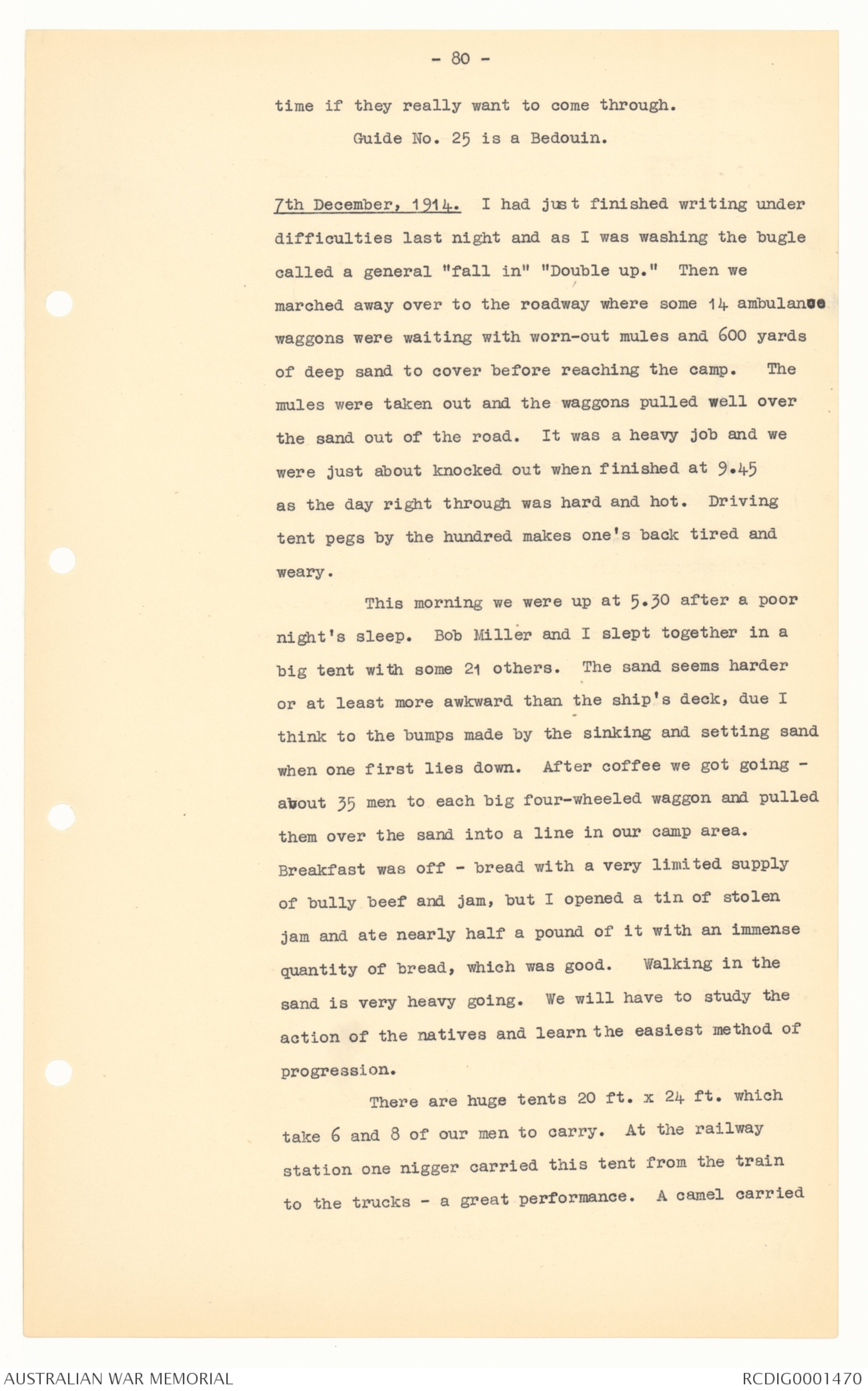
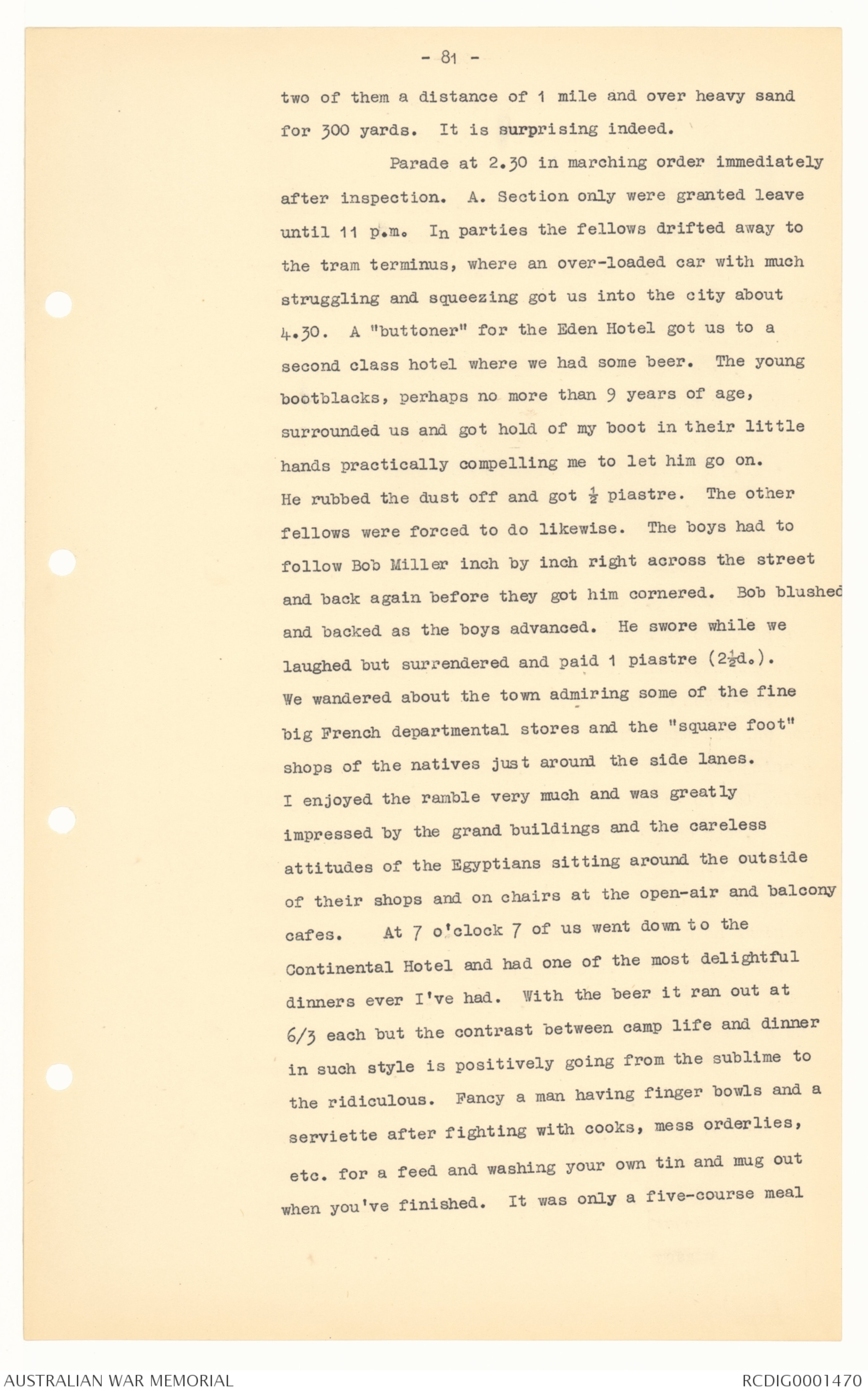
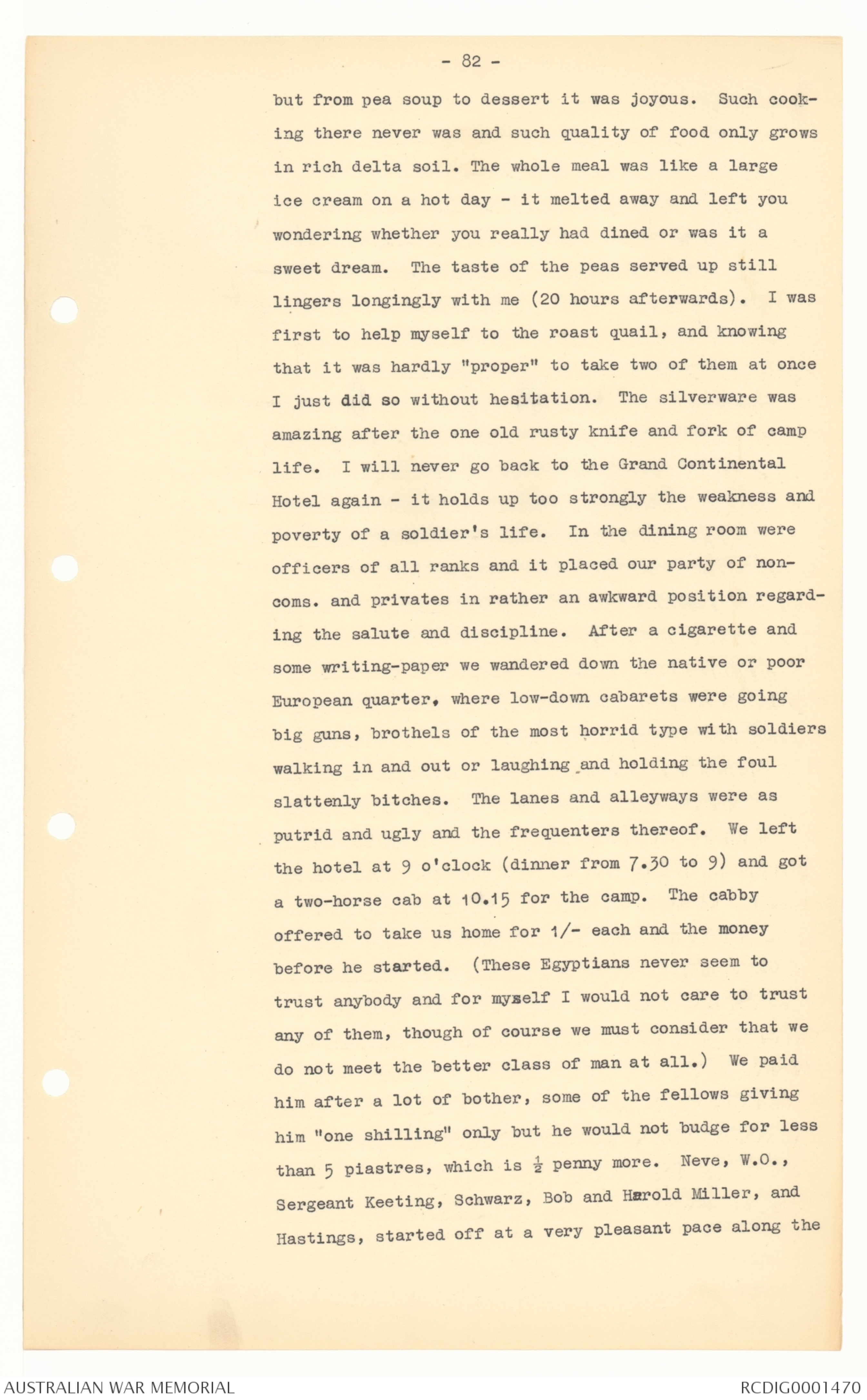
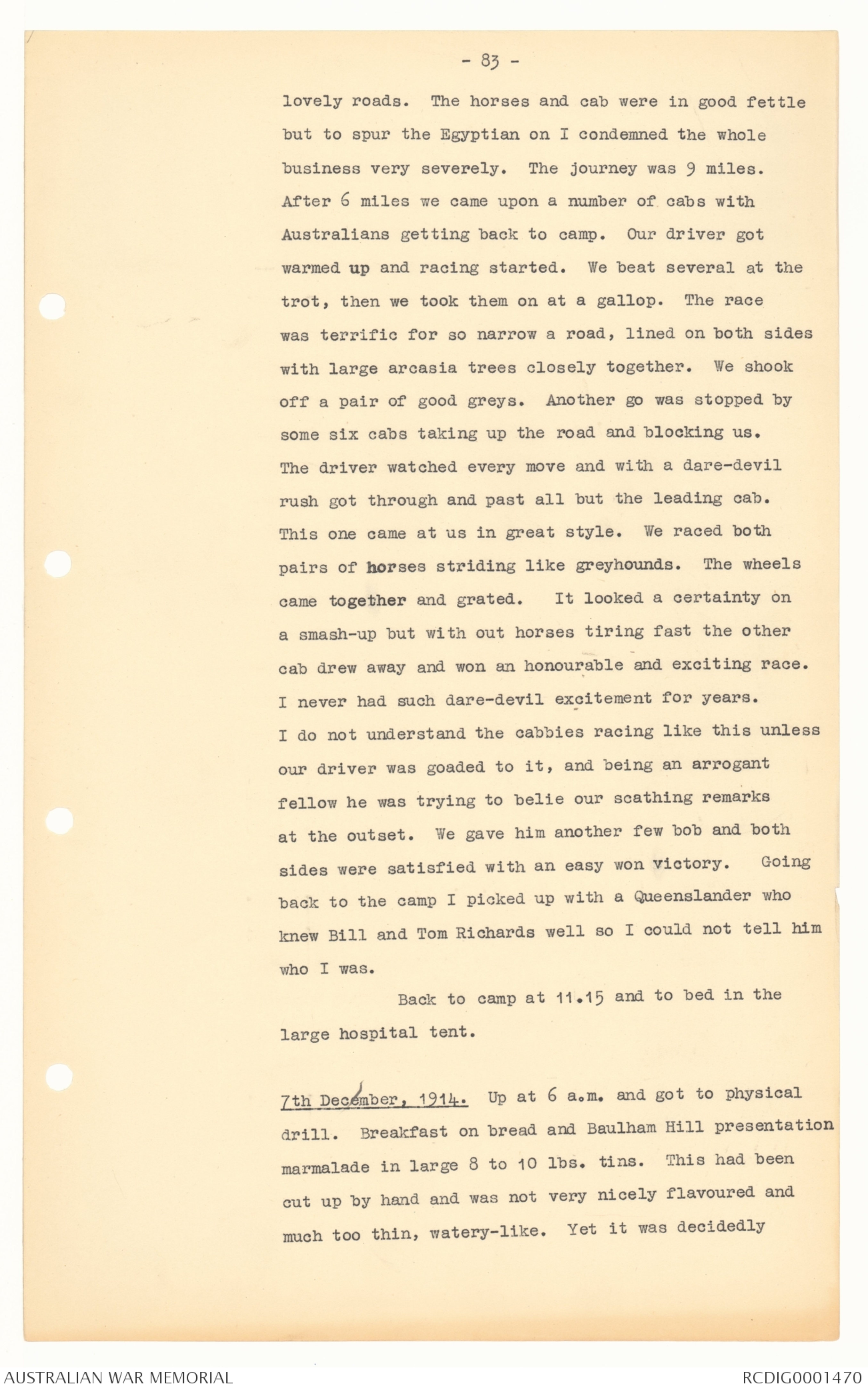
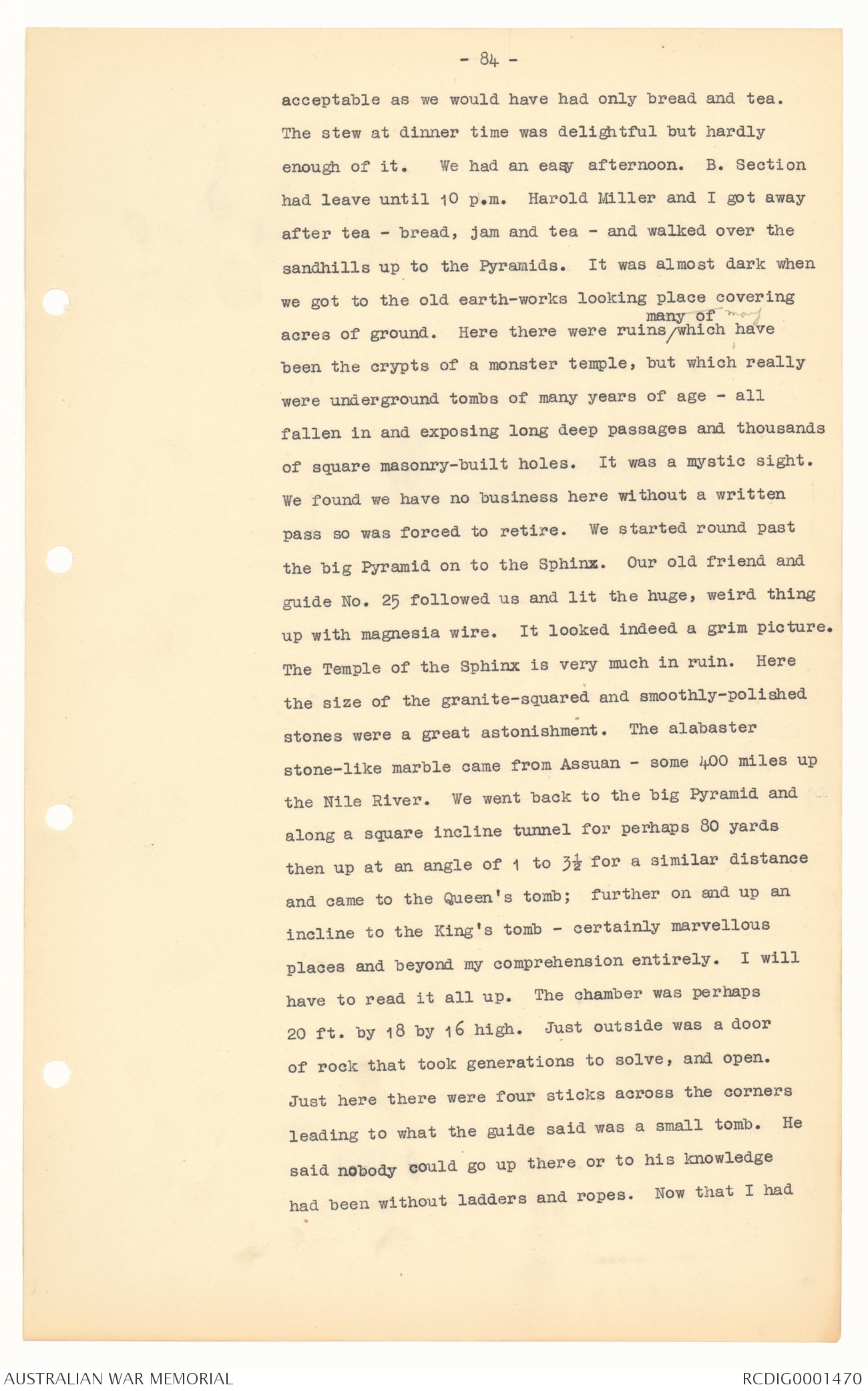
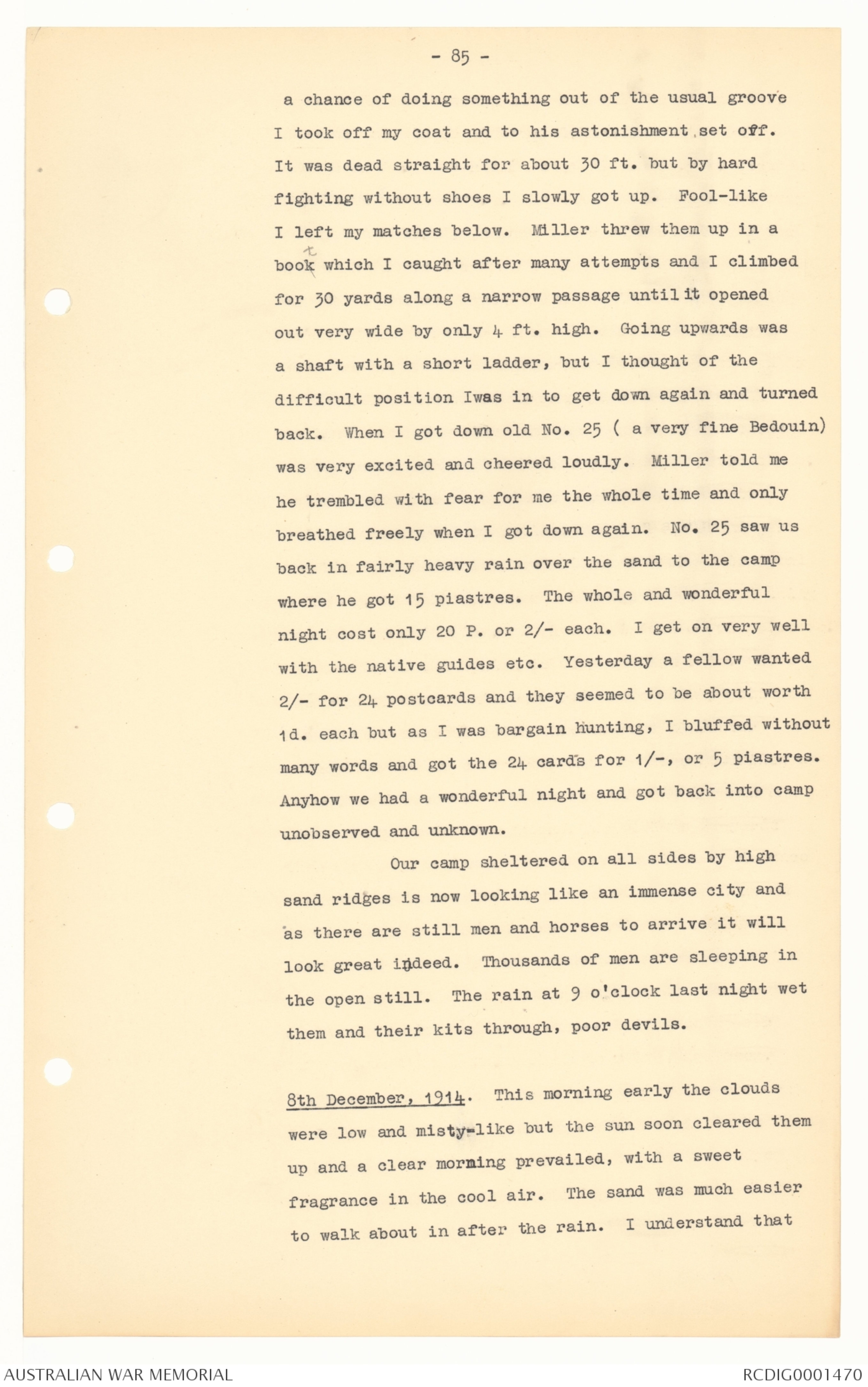
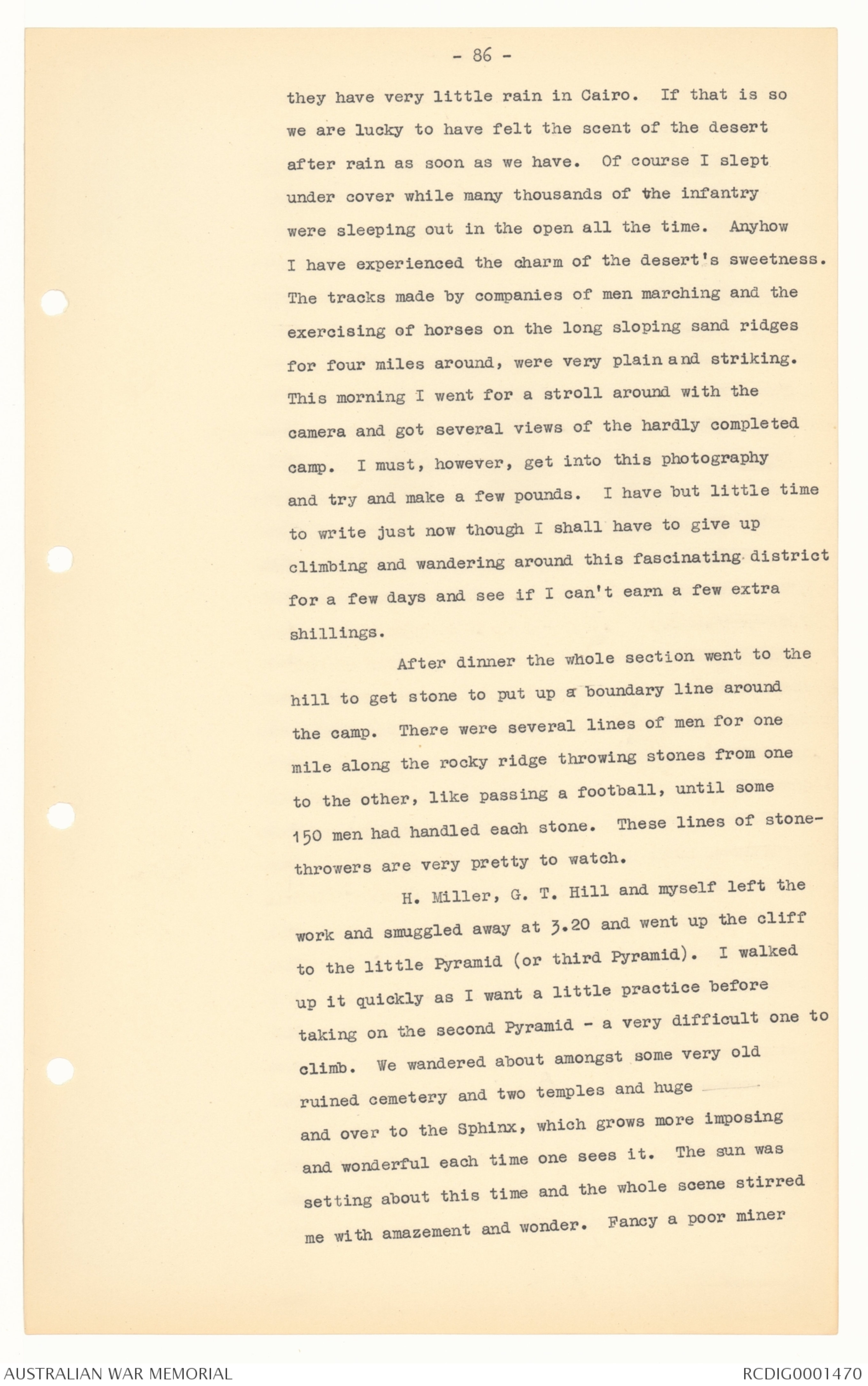
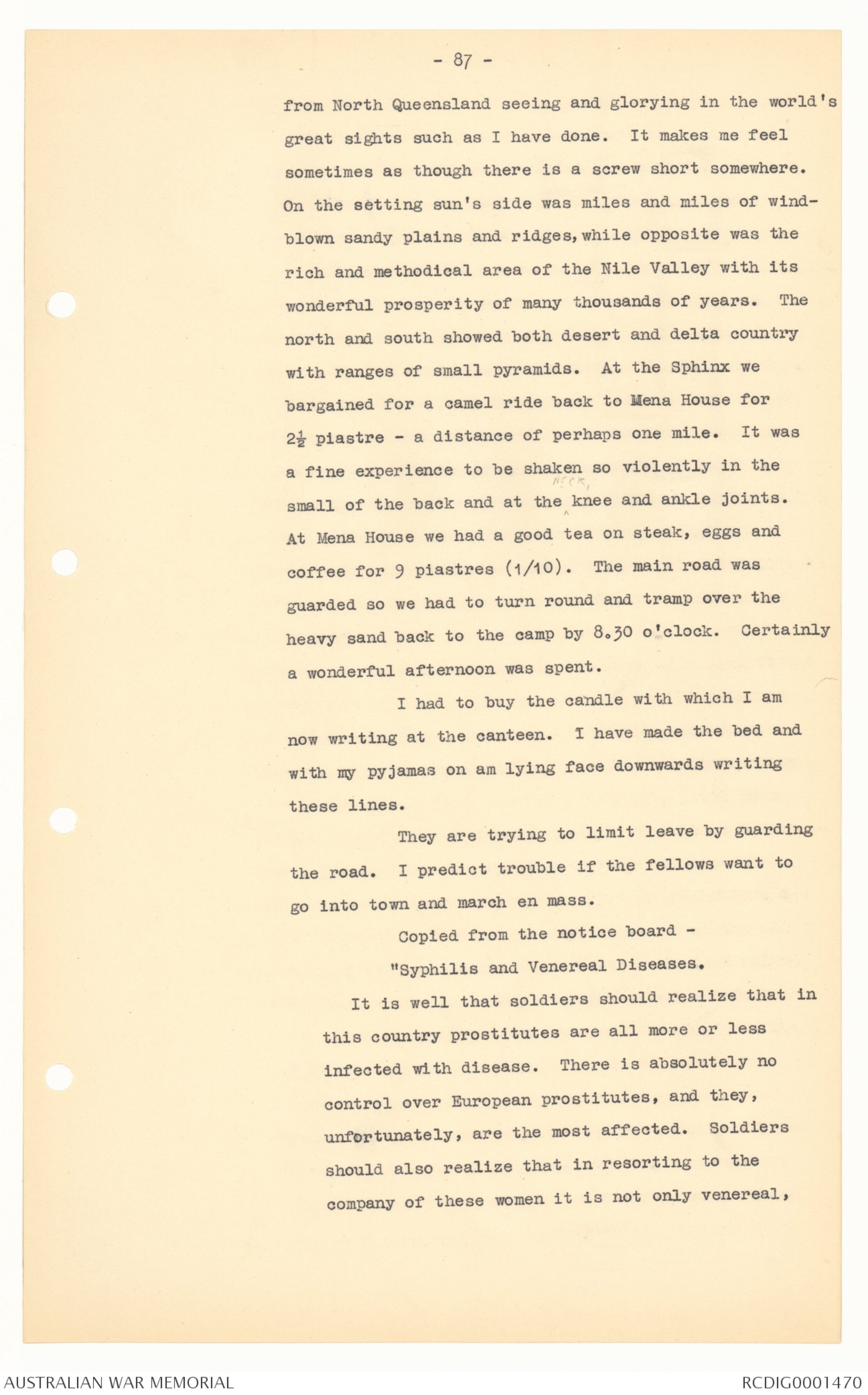
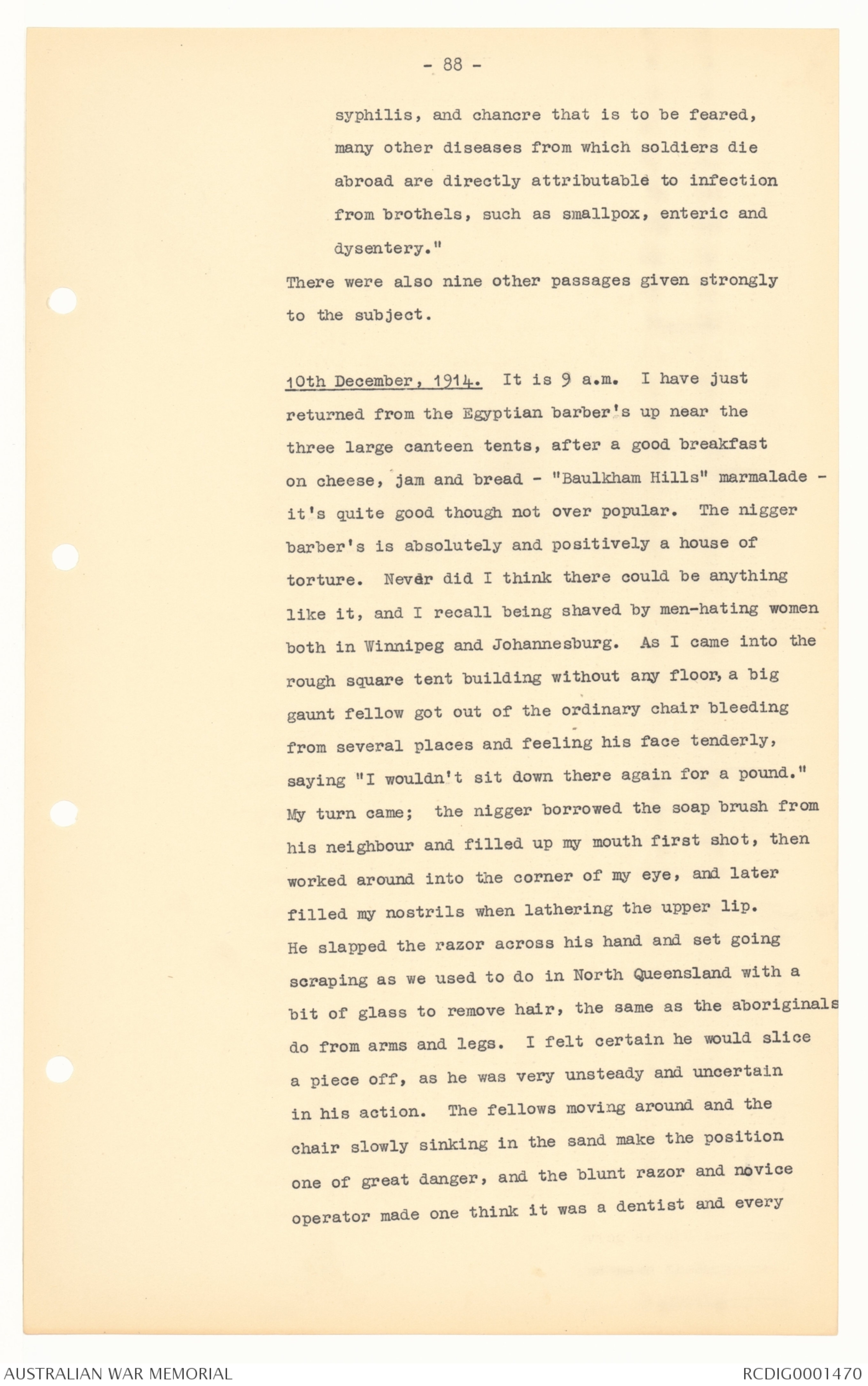
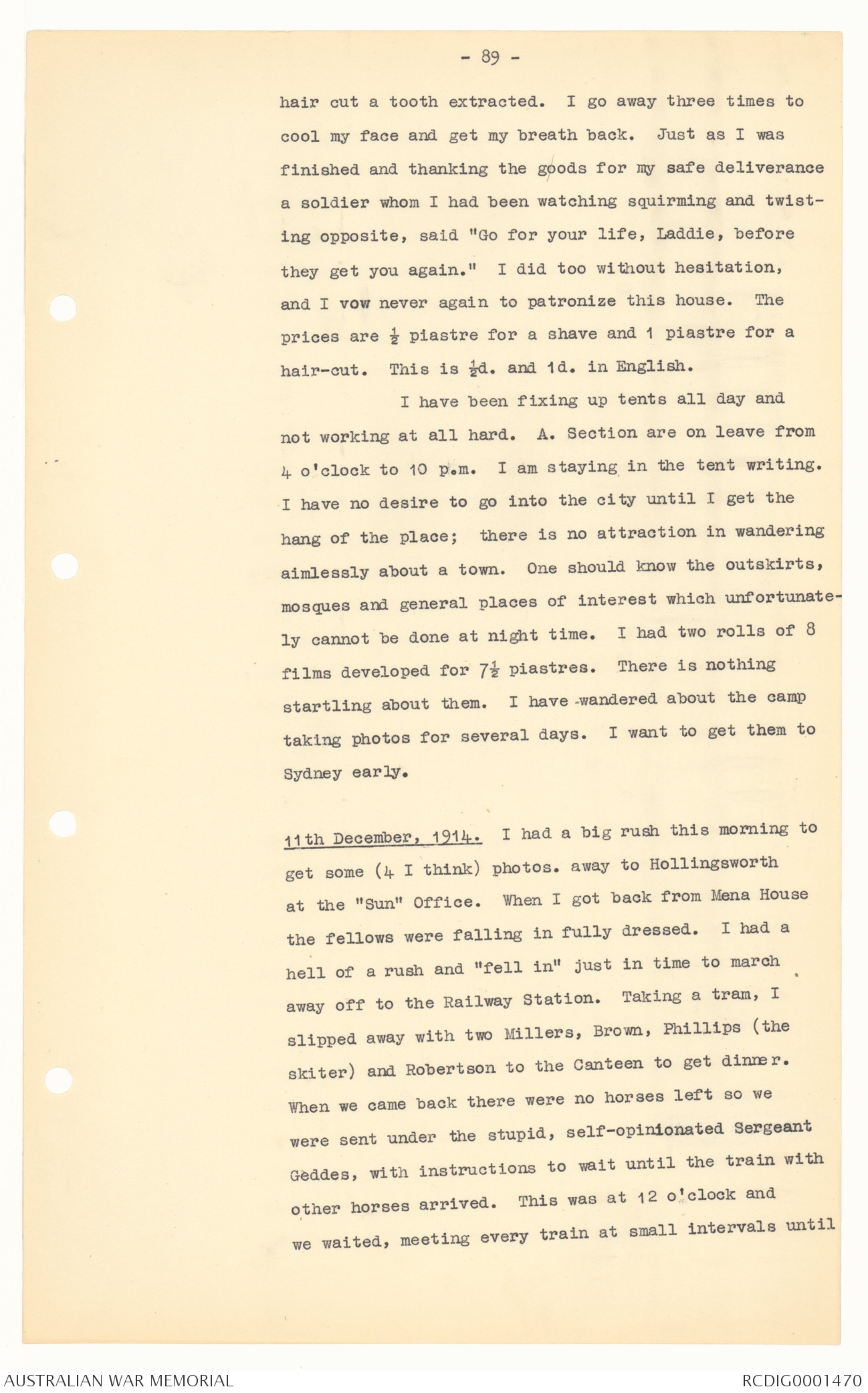
- 80 -
time if they really want to come through.
Guide No. 25 is a Bedouin.
7th December, 1914. I had just finished writing under
difficulties last night and as I was washing the bugle
called a general "fall in" "Double up." Then we
marched away over to the roadway where some 14 ambulance
waggons were waiting with worn-out mules and 600 yards
of deep sand to cover before reaching the camp. The
mules were taken out and the waggons pulled well over
the sand out of the road. It was a heavy job and we
were just about knocked out when finished at 9.45
as the day right through was hard and hot. Driving
tent pegs by the hundred makes one's back tired and
weary.
This morning we were up at 5.30 after a poor
night's sleep. Bob Miller and I slept together in a
big tent with some 21 others. The sand seems harder
or at least more awkward than the ship's deck, due I
think to the bumps made by the sinking and setting sand
when one first lies down. After coffee we got going -
about 35 men to each big four-wheeled waggon and pulled
them over the sand into a line in our camp area.
Breakfast was off - bread with a very limited supply
of bully beef and jam, but I opened a tin of stolen
jam and ate nearly half a pound of it with an immense
quantity of bread, which was good. Walking in the
sand is very heavy going. We will have to study the
action of the natives and learn the easiest method of
progression.
There are huge tents 20 ft. x 24 ft. which
take 6 and 8 of our men to carry. At the railway
station one nigger carried this tent from the train
to the trucks - a great performance. A camel carried
- 81-
two of them a distance of 1 mile and over heavy sand
for 300 yards. It is surprising indeed.
Parade at 2.30 in marching order immediately
after inspection. A. Section only were granted leave
until 11 p.m. In parties the fellows drifted away to
the tram terminus, where an over-loaded car with much
struggling and squeezing got us into the city about
4.30. A "buttoner" for the Eden Hotel got us to a
second class hotel where we had some beer. The young
bootblacks, perhaps no more than 9 years of age,
surrounded us and got hold of my boot in their little
hands practically compelling me to let him go on.
He rubbed the dust off and got ½ piastre. The other
fellows were forced to do likewise. The boys had to
follow Bob Miller inch by inch right across the street
and back again before they got him cornered. Bob blushed
and backed as the boys advanced. He swore while we
laughed but surrendered and paid 1 piastre (2½d.).
We wandered about the town admiring some of the fine
big French departmental stores and the "square foot"
shops of the natives just around the side lanes.
I enjoyed the ramble very much and was greatly
impressed by the grand buildings and the careless
attitudes of the Egyptians sitting around the outside
of their shops and on chairs at the open-air and balcony
cafes. At 7 o'clock 7 of us went down to the
Continental Hotel and had one of the most delightful
dinners ever I've had. With the beer it ran out at
6/3 each but the contrast between camp life and dinner
in such style is positively going from the sublime to
the ridiculous. Fancy a man having finger bowls and a
serviette after fighting with cooks, mess orderlies,
etc. for a feed and washing your own tin and mug out
when you've finished. It was only a five-course meal
- 82 -
but from pea soup to dessert it was joyous. Such cooking
there never was and such quality of food only grows
in rich delta soil. The whole meal was like a large
ice cream on a hot day - it melted away and left you
wondering whether you really had dined or was it a
sweet dream. The taste of the peas served up still
lingers longingly with me (20 hours afterwards). I was
first to help myself to the roast quail, and knowing
that it was hardly "proper" to take two of them at once
I just did so without hesitation. The silverware was
amazing after the one old rusty knife and fork of camp
life. I will never go back to the Grand Continental
Hotel again - it holds up too strongly the weakness and
poverty of a soldier's life. In the dining room were
officers of all ranks and it placed our party of
non-coms. and privates in rather an awkward position regarding
the salute and discipline. After a cigarette and
some writing-paper we wandered down the native or poor
European quarter, where low-down cabarets were going
big guns, brothels of the most horrid type with soldiers
walking in and out or laughing and holding the foul
slattenly bitches. The lanes and alleyways were as
putrid and ugly and the frequenters thereof. We left
the hotel at 9 o'clock (dinner from 7.30 to 9) and got
a two-horse cab at 10.15 for the camp. The cabby
offered to take us home for 1/- each and the money
before he started. (These Egyptians never seem to
trust anybody and for myself I would not care to trust
any of them, though of course we must consider that we
do not meet the better class of man at all.) We paid
him after a lot of bother, some of the fellows giving
him "one shilling" only but he would not budge for less
than 5 piastres, which is ½ penny more. Neve, W.O.,
Sergeant Keeting, Schwarz, Bob and Harold Miller, and
Hastings, started off at a very pleasant pace along the
- 83 -
lovely roads. The horses and cab were in good fettle
but to spur the Egyptian on I condemned the whole
business very severely. The journey was 9 miles.
After 6 miles we came upon a number of cabs with
Australians getting back to camp. Our driver got
warmed up and racing started. We beat several at the
trot, then we took them on at a gallop. The race
was terrific for so narrow a road, lined on both sides
with large arcasia trees closely together. We shook
off a pair of good greys. Another go was stopped by
some six cabs taking up the road and blocking us.
The driver watched every move and with a dare-devil
rush got through and past all but the leading cab.
This one came at us in great style. We raced both
pairs of horses striding like greyhounds. The wheels
came together and grated. It looked a certainty on
a smash-up but with out horses tiring fast the other
cab drew away and won an honourable and exciting race.
I never had such dare-devil excitement for years.
I do not understand the cabbies racing like this unless
our driver was goaded to it, and being an arrogant
fellow he was trying to belie our scathing remarks
at the outset. We gave him another few bob and both
sides were satisfied with an easy won victory. Going
back to the camp I picked up with a Queenslander who
knew Bill and Tom Richards well so I could not tell him
who I was.
Back to camp at 11.15 and to bed in the
large hospital tent.
7th December, 1914. Up at 6 a.m. and got to physical
drill. Breakfast on bread and Baulham Hill presentation
marmalade in large 8 to 10 lbs. tins. This had been
cut up by hand and was not very nicely flavoured and
much too thin, watery-like. Yet it was decidedly
- 84 -
acceptable as we would have had only bread and tea.
The stew at dinner time was delightful but hardly
enough of it. We had an easy afternoon. B. Section
had leave until 10 p.m. Harold Miller and I got away
after tea - bread, jam and tea - and walked over the
sandhills up to the Pyramids. It was almost dark when
we got to the old earth-works looking place covering
acres of ground. Here there were ruins /many of which ^may have
been the crypts of a monster temple, but which really
were underground tombs of many years of age - all
fallen in and exposing long deep passages and thousands
of square masonry-built holes. It was a mystic sight.
We found we have no business here without a written
pass so was forced to retire. We started round past
the big Pyramid on to the Sphinx. Our old friend and
guide No. 25 followed us and lit the huge, weird thing
up with magnesia wire. It looked indeed a grim picture.
The Temple of the Sphinx is very much in ruin. Here
the size of the granite-squared and smoothly-polished
stones were a great astonishment. The alabaster
stone-like marble came from Assuan - some 400 miles up
the Nile River. We went back to the big Pyramid and
along a square incline tunnel for perhaps 80 yards
then up at an angle of 1 to 3½ for a similar distance
and came to the Queen's tomb; further on and up an
incline to the King's tomb - certainly marvellous
places and beyond my comprehension entirely. I will
have to read it all up. The chamber was perhaps
20 ft. by 18 by 16 high. Just outside was a door
of rock that took generations to solve, and open.
Just here there were four sticks across the corners
leading to what the guide said was a small tomb. He
said nobody could go up there or to his knowledge
had been without ladders and ropes. Now that I had
- 85 -
a chance of doing something out of the usual groove
I took off my coat and to his astonishment, set off.
It was dead straight for about 30 ft. but by hard
fighting without shoes I slowly got up. Fool-like
I left my matches below. Miller threw them up in a
bookt which I caught after many attempts and I climbed
for 30 yards along a narrow passage until it opened
out very wide by only 4 ft. high. Going upwards was
a shaft with a short ladder, but I thought of the
difficult position Iwas in to get down again and turned
back. When I got down old No. 25 (a very fine Bedouin)
was very excited and cheered loudly. Miller told me
he trembled with fear for me the whole time and only
breathed freely when I got down again. No. 25 saw us
back in fairly heavy rain over the sand to the camp
where he got 15 piastres. The whole and wonderful
night cost only 20 P. or 2/- each. I get on very well
with the native guides etc. Yesterday a fellow wanted
2/- for 24 postcards and they seemed to be about worth
1d. each but as I was bargain hunting, I bluffed without
many words and got the 24 cards for 1/-, or 5 piastres.
Anyhow we had a wonderful night and got back into camp
unobserved and unknown.
Our camp sheltered on all sides by high
sand ridges is now looking like an immense city and
as there are still men and horses to arrive it will
look great indeed. Thousands of men are sleeping in
the open still. The rain at 9 o'clock last night wet
them and their kits through, poor devils.
8th December, 1914. This morning early the clouds
were low and misty-like but the sun soon cleared them
up and a clear morning prevailed, with a sweet
fragrance in the cool air. The sand was much easier
to walk about in after the rain. I understand that
- 86 -
they have very little rain in Cairo. If that is so
we are lucky to have felt the scent of the desert
after rain as soon as we have. Of course I slept
under cover while many thousands of the infantry
were sleeping out in the open all the time. Anyhow
I have experienced the charm of the desert's sweetness.
The tracks made by companies of men marching and the
exercising of horses on the long sloping sand ridges
for four miles around, were very plain and striking.
This morning I went for a stroll around with the
camera and got several views of the hardly completed
camp. I must, however, get into this photography
and try and make a few pounds. I have but little time
to write just now though I shall have to give up
climbing and wandering around this fascinating district
for a few days and see if I can't earn a few extra
shillings.
After dinner the whole section went to the
hill to get stone to put up a boundary line around
the camp. There were several lines of men for one
mile along the rocky ridge throwing stones from one
to the other, like passing a football, until some
150 men had handled each stone. These lines of stone-
throwers are very pretty to watch.
H. Miller, G. T. Hill and myself left the
work and smuggled away at 3.20 and went up the cliff
to the little Pyramid (or third Pyramid). I walked
up it quickly as I want a little practice before
taking on the second Pyramid - a very difficult one to
climb. We wandered about amongst some very old
ruined cemetery and two temples and huge
and over to the Sphinx, which grows more imposing
and wonderful each time one sees it. The sun was
setting about this time and the whole scene stirred
me with amazement and wonder. Fancy a poor miner
- 87 -
from North Queensland seeing and glorying in the world's
great sights such as I have done. It makes me feel
sometimes as though there is a screw short somewhere.
On the setting sun's side was miles and miles of
windblown sandy plains and ridges, while opposite was the
rich and methodical area of the Nile Valley with its
wonderful prosperity of many thousands of years. The
north and south showed both desert and delta country
with ranges of small pyramids. At the Sphinx we
bargained for a camel ride back to Mena House for
2½ piastre - a distance of perhaps one mile. It was
a fine experience to be shaken so violently in the
small of the back and at the ^neck, knee and ankle joints.
At Mena House we had a good tea on steak, eggs and
coffee for 9 piastres (1/10). The main road was
guarded so we had to turn round and tramp over the
heavy sand back to the camp by 8.30 o'clock. Certainly
a wonderful afternoon was spent.
I had to buy the candle with which I am
now writing at the canteen. I have made the bed and
with my pyjamas on am lying face downwards writing
these lines.
They are trying to limit leave by guarding
the road. I predict trouble if the fellows want to
go into town and march en mass.
Copied from the notice board -
"Syphilis and Venereal Diseases.
It is well that soldiers should realize that in
this country prostitutes are all more or less
infected with disease. There is absolutely no
control over European prostitutes, and they,
unfortunately, are the most affected. Soldiers
should also realize that in resorting to the
company of these women it is not only venereal,
- 88 -
syphilis, and chancre that is to be feared,
many other diseases from which soldiers die
abroad are directly attributable to infection
from brothels, such as smallpox, enteric and
dysentery.'
There were also nine other passages given strongly
to the subject.
1Oth December, 1914. It is 9 a.m. I have just
returned from the Egyptian barber's up near the
three large canteen tents, after a good breakfast
on cheese, jam and bread - "Baulkham Hills" marmalade
it's quite good though not over popular. The nigger
barber's is absolutely and positively a house of
torture. Never did I think there could be anything
like it, and I recall being shaved by men-hating women
both in Winnipeg and Johannesburg. As I came into the
rough square tent building without any floor, a big
gaunt fellow got out of the ordinary chair bleeding
from several places and feeling his face tenderly,
saying "I wouldn't sit down there again for a pound."
My turn came; the nigger borrowed the soap brush from
his neighbour and filled up my mouth first shot, then
worked around into the corner of my eye, and later
filled my nostrils when lathering the upper lip.
He slapped the razor across his hand and set going
scraping as we used to do in North Queensland with a
bit of glass to remove hair, the same as the aboriginals
do from arms and legs. I felt certain he would slice
a piece off, as he was very unsteady and uncertain
in his action. The fellows moving around and the
chair slowly sinking in the sand make the position
one of great danger, and the blunt razor and novice
operator made one think it was a dentist and every
- 89-
hair cut a tooth extracted. I go away three times to
cool my face and get my breath back. Just as I was
finished and thanking the goods for my safe deliverance
a soldier whom I had been watching squirming and twisting
opposite, said "Go for your life, Laddie, before
they get you again." I did too without hesitation,
and I vow never again to patronize this house. The
prices are ½ piastre for a shave and 1 piastre for a
hair-cut. This is ½d. and 1d. in English.
I have been fixing up tents all day and
not working at all hard. A. Section are on leave from
4 o'clock to 10 p.m. I am staying in the tent writing.
I have no desire to go into the city until I get the
hang of the place; there is no attraction in wandering
aimlessly about a town. One should know the outskirts,
mosques and general places of interest which unfortunately
cannot be done at night time. I had two rolls of 8
films developed for 7½ piastres. There is nothing
startling about them. I have wandered about the camp
taking photos for several days. I want to get them to
Sydney early.
11th December, 1914. I had a big rush this morning to
get some (4 I think) photos. away to Hollingsworth
at the "Sun" Office. When I got back from Mena House
the fellows were falling in fully dressed. I had a
hell of a rush and "fell in" just in time to march
away off to the Railway Station. Taking a tram, I
slipped away with two Millers, Brown, Phillips (the
skiter) and Robertson to the Canteen to get dinner.
When we came back there were no horses left so we
were sent under the stupid, self-opinionated Sergeant
Geddes, with instructions to wait until the train with
other horses arrived. This was at 12 o'clock and
we waited, meeting every train at small intervals until
 Sam scott
Sam scottThis transcription item is now locked to you for editing. To release the lock either Save your changes or Cancel.
This lock will be automatically released after 60 minutes of inactivity.